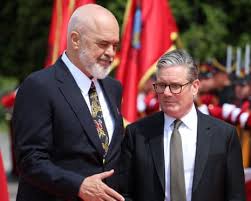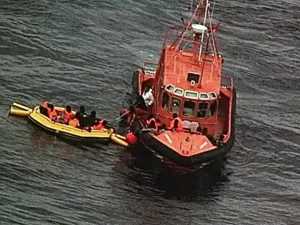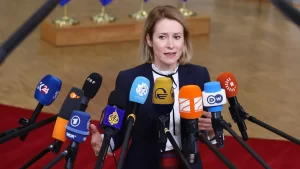Third-country asylum plan shows UK is in ‘a very dark place’, says Albanian PM

London: A UK plan to send refused asylum seekers to “return hubs” in third countries shows post-Brexit Britain is “in a very dark place”, Albania’s prime minister has said.
In his first interview with the international media since leading his socialist party to a historic fourth term in office, Edi Rama said the idea of the UK wanting to “look for places to dump immigrants” would have been inconceivable a decade ago.
But it was in keeping with the shift in public discourse in Britain since Brexit, in which the “totally unacceptable, totally ridiculous, totally shameful” had become normalised, he said.
Announced last month by Keir Starmer during a visit to the Balkan state, the “return hubs” scheme would involve centres in a third country processing the claims of people refused asylum who have exhausted legal pathways in the UK.
“It’s one of those things that 10 years ago would simply not have not been imaginable … that Britain would look for places to dump immigrants,” Rama said from Tirana, the Albanian capital.
“The fact that today it’s not just imaginable, it’s happening, is not because of Keir Starmer or [Rishi] Sunak doing something outrageous; it’s because of the country being in a very dark place.”
Edi Rama meets with Rishi Sunak on the sidelines of the European Political Community summit in Granada, Spain, in October 2023.
Rama, who is renowned for his outspoken and contrarian views, voiced dismay at the level of public discourse in the UK. As a committed anglophile, he said, it was hard to take in.
“Eighty per cent of the things that are said, or are written, or are accepted as a normal part of the discourse in today’s Britain are things that [before Brexit] would have been totally unacceptable, totally ridiculous, totally shameful,” he said.
Under former Tory governments, relations between the UK and Albania became increasingly strained, overshadowed by boat crossings and accusations of illegal Albanian immigrants “invading” British shores.
Starmer’s visit in May – the first ever by a British prime minister – – was aimed at putting bilateral relations on a new footing. While in Tirana, the Labour leader said talks were under way “with a number of countries” to set up the hubs. But, in a move seen as a gentle rebuke to his guest, Rama said in a joint press conference that Albania would not be participating in the scheme.
Seeking to put the record straight in the interview, Rama said that Starmer, a “very decent [and] a delightful person”, had neither made the request publicly nor been the first British leader to privately broach the subject. Rama said his response had always been the same: “I have been clear about this since Boris Johnson asked me and Rishi asked me … I’ve always said no.”
That Albania had previously agreed to a similar scheme with Italy’s prime minister, Giorgia Meloni, was different because of the “very special relationship” the two countries had. That deal, which envisaged intercepting people at sea and taking most of them not to Italy but to a reception centre in Albania for their asylum claims to be processed, has so far been obstructed by legal objections.
From the day Albania’s brutal Stalinist regime collapsed in 1991, Italy had stood by his country, Rama said. As a result his compatriots had “a weak spot” for Rome.
“Practically we are one country made of two independent countries … Italy has been there for us in every dark moment and difficult situation since the day we got out of the hell of [being] the North Korea of Europe,” he added. “[We] have a weak spot for Italy, so when Italy asks us for something we say yes, full stop.”
Rama’s stance coincides with a newfound confidence as the small country, among Europe’s poorest states, makes once-unthinkable strides towards joining the EU. With a dramatic change of pace and tone that he attributes to the new “geopolitically driven spirit” of European policymakers since Russia’s full-scale invasion of Ukraine, accession negotiations have accelerated as Brussels finally seeks to embrace the western Balkans. The region has long been viewed by Moscow as falling into Russia’s sphere of influence.





